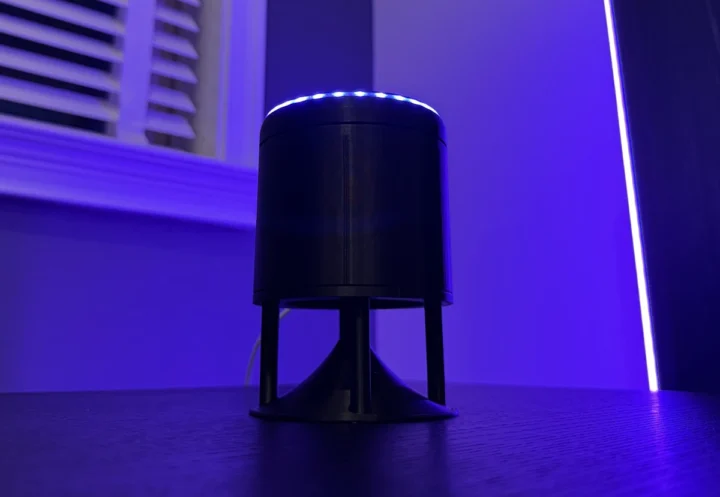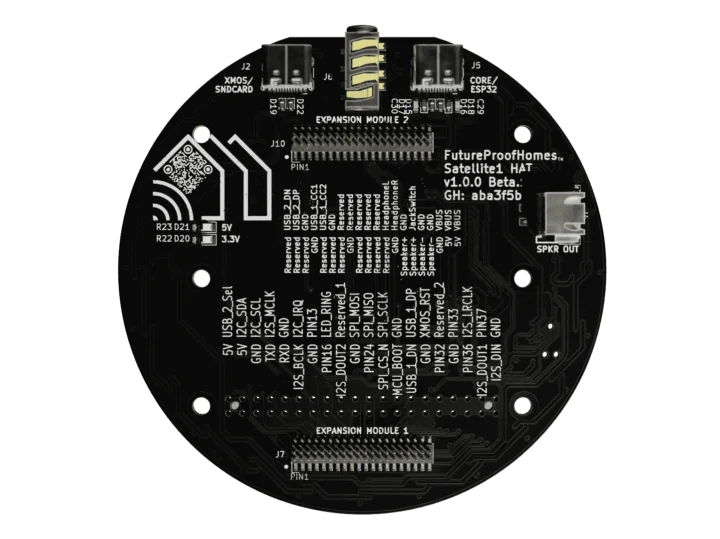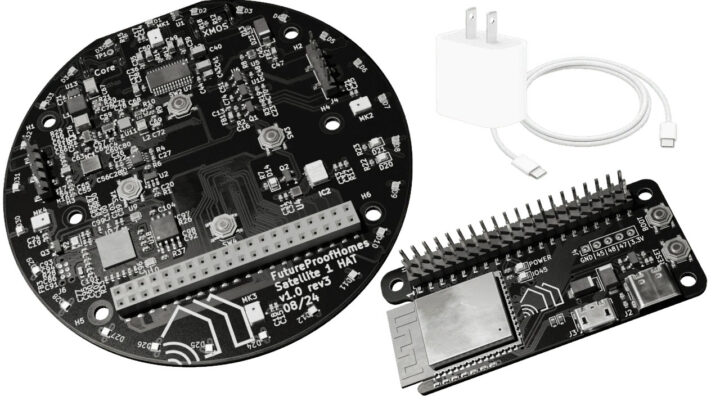FutureProofHomes’ Satellite1 Dev Kit is a DIY voice assistant comprised of an ESP32-S3 WiFi and Bluetooth board running ESPHome and an audio “HAT” based on XMOS XU316 audio processor designed for Home Assistant compatibility.
It can be used as a smart speaker with a 25W amplifier, a headphone jack, and a built-in 4-microphone array, a music player, and an environmental monitoring system with temperature, humidity, luminosity, and presence sensors. The HAT can also be used with a Raspberry Pi with a 40-pin GPIO header, and two extra 40-pin connectors are reserved for future accessories.
Satellite1 Dev Kit specifications:
- Wireless SoC – Espressif Systems ESP32-S3
- CPU – Dual-core 32-bit LX7 processor running at 240 MHz
- Memory – 512 KB SRAM, 8 MB PSRAM.
- Storage – 16 MB Flash
- Wireless – WiFi 4 and Bluetooth 5.x
- Audio Processor – XMOS XU316 (XU316-1024-QF60V-I32) 16-core 32-bit RISC processor running at 800 MHz with 3200 MIPS, 1024 KB SRAM, and 8 MB Flash.
- Audio
- Line-level output: PCM5122
- 25W Mono Speaker: TAS2780 (requires a 9V @ 3A power adapter, included)
- 3.5mm headphone jack
- 4x high-performance microphones; note: only two are supported in XMOS firmware for now, but a future firmware upgrade will fix that.
- Sensors:
- Ambient Light: LTR-303ALS
- Temperature & Humidity: AHT20
- Optional: Add your own LD2410 or LD2450 for mmWave radar human presence detection
- Expansion
- 40-pin Raspberry Pi GPIO header
- 2x 40-pin expansion connectors for future accessories
- Misc
- 4x programmable tactile buttons
- 24x NeoPixel RGB LEDs
- Power Requirements
- 5V with headphone jack
- Recommended 9V @ 3A for standard speaker amplification.
- Supports up to 20V @ 1.5A for larger speaker amplification.
- Dimensions – 88 x 88 x 10 mm
- Weight – 44 grams

The company provides 3D files and instructions for a snap-fit enclosure that can be printed on a single plate. Users will need to bring their own speaker, and the company recommends models from Dayton Audio, Tectonic, and GRS. The optional mmWave sensor is not included in the kit either.
The PDF schematics and some renders of the ESP32-S3 CORE board and XU316 HAT expansion are shared on GitHub, and instructions to get started with Home Assistant configuration, firmware customization, and more can be found on the documentation website.

In some ways, the Satellite1 Dev Kit has a design very similar to the ReSpeaker Lite Voice Assistant Kit and Nabu Casa’s Voice Preview, since all feature the same ESP32-S3 + XU316 combo optimized for Home Assistant Voice Control. However, the Satellite1 supports much more powerful up to 25W speakers instead of 5W and 3W speakers for Seeed Studio and Nabu Case solutions. It also integrates sensors for environmental monitoring, and future expansion capabilities are potentially better thanks to two 40-pin expansion connectors.
The Satellite1 Dev Kit is now up for pre-order for $79.99 with shipping scheduled for June 2025. Alternatively, you can get the Satellite1 HAT Board only for $54.99 to connect it to a Raspberry Pi or compatible SBC with a 40-pin GPIO header, or a computer through USB-C.
Thanks to Hedda for the tip.

Jean-Luc started CNX Software in 2010 as a part-time endeavor, before quitting his job as a software engineering manager, and starting to write daily news, and reviews full time later in 2011.
Support CNX Software! Donate via cryptocurrencies, become a Patron on Patreon, or purchase goods on Amazon or Aliexpress. We also use affiliate links in articles to earn commissions if you make a purchase after clicking on those links.




